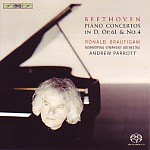Beethoven’s concertos are true partnerships, so when one of the partners is crippled the result can only be failure. These performances have been experiments of sorts, in that Ronald Brautigam claims to be attempting to recreate some of the characteristics of a fortepiano on a modern instrument. In the earlier releases in this series he has been impressive, offering a lively variety of touch and articulation at consistently swift basic tempos. He attempts something similar here with far less success, perhaps because Beethoven’s mature style has outgrown the approach.
Leaving aside for the moment the aesthetic value of Beethoven’s not terribly interesting piano arrangement of the Violin Concerto, Brautigam is undermined at every turn by Andrew Parrott’s relentless and (from a scholarly point of view) deluded pursuit of “authenticity” in the orchestra, meaning in this case edgy and forward winds married to really nasal, dry, vibrato-less strings. In the early concertos this mattered mostly in the slow movements, less elsewhere; but here, in Beethoven’s two most lyrically expansive concertos, with their long-breathed themes, the result of such a dogmatic approach is pretty disgusting, and as a willing participant Brautigam must be held equally to blame. If the Norrköping Symphony under Parrott is vying with Norrington’s Stuttgart players for the title of “Europe’s Ugliest Modern Orchestra”, they are well on their way.
The first movement of the Fourth Concerto, for example, withers on the vine every time the full orchestra responds to the piano–the second subject is particularly anemic, and sustained passages for the strings (there are a lot of them) will make you wince. But even aside from the vibrato issue, there are other interpretive miscalculations.
Parrott emasculates the second movement, with an exaggeratedly light staccato articulation and a compressed dynamic range that scarcely does justice to Beethoven’s dialog between two opposing forces. Let’s not forget that the orchestra theoretically starts forte and ends triple-piano; nor does Brautigam make much effort to characterize his side of the exchange. His playing takes on a certain generic quality: neat, clean, certainly energetic where required, but not otherwise memorable given the demands of these particular works. Granted, this slow movement doesn’t have to sound like Orpheus taming the furies (a favorite image of the Romantic period), but neither should it evoke, as here, the Two Fat Ladies bickering over the amount of butter to add to a pastry dough.
The finale, by contrast, is simply too fast. Granted, if you’re going to have the solo cello at the opening play with a timbre about as alluring as a gnat buzzing in your ear, then it helps to get it over with; but Beethoven only marks the movement “vivace”. Leopold Mozart in his Violin School defines that as “the mean between quick and slow,” and not “like a bat out of hell.” Furthermore, if Brautigam wishes to use Beethoven’s slightly more elaborate version of the piano part, it would be nice if he allowed his listeners sufficient time to hear and savor the differences from the traditional version.
Given these deficiencies, there’s no need to consider the violin concerto transcription in any detail. The situation with the orchestra is just as bad if not worse, and compared to the imagination shown by, say, Peter Serkin and Seiji Ozawa in their hyper-lyrical RCA recording, Brautigam and Parrott offer little more than an expressive approximation of the original. Great sound from the BIS engineers, but so what? This is just one more example of how “authenticity” offers no guarantee of basic, common-sense musicality.
































